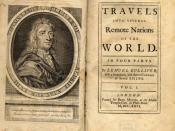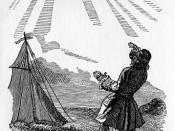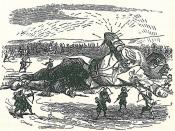Write an essay on the treatment of 'the outsider' in the work of any one or more writers of the period.
Jonathan Swift was born in Dublin, Ireland were he grew up in the care of his uncle. He then attended Trinity College at the age of fourteen, where he stayed for seven years. After graduating he then became the secretary to Sir William Temple who was a English politician and member of the Whig party, he later took religious orders in the church of Ireland and spent a year as a country parson. He then spent further time in the service of Temple before returning to Ireland to become the chaplain of the earl of Berkeley. During this time he had begun to write satires on the political and religious corruption that surrounded him, and he also wrote a number of political pamphlets in favour of the Whig party.
In 1709 he went to London to campaign for the Irish church but was unsuccessful. Due to conflicts with the Whig party, mostly about his strong allegiance to the church, he became a member of the conservative Tory party in 1710. Unfortunately for Swift, the Tory government fell out of power in 1714 and Swift, although he was famed for his writings, fell out of favour. Swift had been hoping to be assigned to a position in the Church of England but instead he returned to Ireland and became the dean of St. Patrick's. He continued to write pamphlets in particular ones to weaken England's economy and political power, most of which shocked. Gulliver's Travels was a very controversial work when it was first published in 1726, and it wasn't until ten years later that the book appeared with the entire text that Swift had originally intended to have. Gulliver's Travels is a biting satire, and Swift ensures that it is both humorous and critical, he is constantly attacking British and European society through its descriptions of imaginary countries.
Lemuel Gulliver is a practical minded Englishman, he is a trained surgeon who's business fails so he decides to take to the seas in order to earn money, for himself and his family. In first person narrative Gulliver rarely shows any signs of self reflection or emotions and narrates the adventures he stumbles across. The first paragraph in part one of the novel is extremely interesting as it seems that it is just to simply provide information about Gulliver's life thus far, the bare essentials needed in order to proceed to the more interesting travel narrative.
"My Father had a small Estate in Nottinghamshire; I was the Third of five Sons.... I was bound Apprentice to Mr. James Bates, an eminent Surgeon in London ... my Father now and then sending me small Sums of Money..... When I left Mr. Bates, I went down to my Father; where by the assistance of him and my Uncle John ..... I got Forty Pounds, and a Promise of Thirty Pounds a Year".(1) This paragraph however reveals a lot about Gulliver's character that is necessary to understand not just his journey's but also how he narrates them. Gulliver is primarily interested in money, acquistions and achievement, and we see his life story through these desires. The first sentence is more than just a statement of his social and financial situation, because he is the third son of a man who only owns a 'small Estate' it would be very unlikely that he would inherit enough to support himself, so he would have been expected to leave the estate and try to make his own fortune. Had Gulliver been the first born son it is likely that he would have never embarked on his travels. This passage reveals even more in it's tone, which is very impersonal, he provides no sentimental characterisation of his Father, Bates or his Uncle John, they seem to just appear in the story as a means to an end. There is no mention of any dreams, ambitions or romantic attachments, such as his wife, or their marriage. This lack of emotional inner life can be traced through the novel in his narrative until his virtual nervous breakdown at the very end.
Gulliver is a bold adventurer who visits a number of strange lands, but it is hard to see him as truly heroic, he just simply does not show the charisma and wit of which real heroes are made of. We see this on his first voyage when he is ship wrecked on Lilliput, he awakes to find that he is bound by vast quantities of tiny threads and the people who have captured him are tiny. The tiny captors are in awe of Gulliver but are not scared to use violence against him as they are very protective of their kingdom. Gulliver is a very gullibly character, as the name suggests, and we see this when he misses the obvious ways in which the Lilliputians exploit him. He is presented to the emperor who is entertained by Gulliver, just as Gulliver is flattered by the attention of royalty. Eventually he becomes a national resource used by the army in its war against the people of Blefuscu.
His first encounter with another society is entrapment, he is the outsider, he is different, and society has the belief that if some one is different they should be feared or you should be suspicious of them, and this is a classic example of it. Gulliver is the state freak show and Swift shows the corrupted Secretaries of State who sell licences to people who want to view the 'Man Mountain', Gulliver is a gifted linguist and seems to know at least the basics of several European languages which enables him to communicate with the Lilliputian's which is why he has been able to earn some trust, but even this is not enough for him to be accepted by them, " To understand another culture is a feat of analogical ingenuity. Analogies do, however, break down at some point". (2)
Eventually Gulliver has to beg on his knees for his liberty, instead of being tied up like an animal, even when he helps by putting out the fire in the palace he is convicted of treason, and sentenced to have his eyes poisoned by arrows, he realises that he would never be able to fit in, the puzzling thing here is that due to his vast size, you would have thought that he would at least try to escape but every thing that ends up happening to Gulliver is completely by chance, he never has a active role in escaping or discovering a country.
On his next voyage he finds himself in a land of giants called Brobdingnag, a farmer discovers him and again he is treated as an animal and is kept for the farmers amusement, he again is not accepted as one of these people and therefore is treated differently. The farmer eventually sells Gulliver to the Queen, who makes him a courtly diversion and is entertained by his musical talents. He is startled by the ignorance of the people here and in particular how even the King does not know any thing about politic's. Another important event happens in this country that is invaluable to the story, it is the comments the King makes about Gulliver's society after he has told him about it, "My little friend Grildrig..... I cannot but conclude the Bulk of your Natives, to be the most pernicious Race of little odious Vermin that Nature ever suffered to crawl upon the Surface of the Earth".(3)
This is a harsh denunciation of mankind in it's current state, and it is this comment that dominates Gulliver's mind by the end of Gulliver's Travels. The judgement is quite ironic because Gulliver's intention in telling the King is to convince him of England's significance, but the King acts like Gulliver intended to show the faults of his land. When the King mocks England however it is important to know that it is Gulliver's naive and unthinking acceptance of his own society that is being mocked as well. Swift here is raising the issue of ideology, which is a person's brain washed way of taking for granted a social arrangement that could or should be criticised and improved. The Brobdingnagian queen is hardly a well developed character in this novel but she is well liked by Gulliver, she is one of the very few females in Gulliver's Travels who is given much notice. However even though at first Gulliver is treated the same way here as every other country he went to, it changes mostly due to the kindness of the Queen. In the other lands it is difficult for Gulliver, being such an outsider, to see or get a glimpse of family relations or private affairs, but because he is treated as a doll or play thing here, he gets to see that side of the people. This is when we realise that Gulliver is capable of emotional feelings and connections.
Although Gulliver travels to a number of other countries, he encounters more or less the same reaction, either funny looks or non acceptance. I think that where we see Gulliver completely cut himself off from every where, so he is a complete outsider, is when he is in the unknown land of the Houyhnhnms, these are rational thinking horses who rule the land and also Yahoos who are brutish human like creatures who serve the Houyhnhnms. Gulliver is fascinated with them and begins to learn their language, when he can speak he narrates his voyages to them and explains the constitution of England.
Gulliver sees the Houyhnhnms also practice strict family planning, dictating that the parents of two females should exchange a child with a family of two males, so that the male to female ratio is perfectly maintained. This shows how the horses are similar to Gulliver in the way that they show a lack of emotion as well, but they are good and rational and are more or less interchangeable they are without individual identities, in absolute fusion with their society. This calls to Gulliver as he is the exact opposite of this as he has hardly any sense of belonging to his native society and exists only as an individual eternally wandering the seas, in a way he is longing for a community where he can lose his human identity. This is impossible for him however, as he is not a horse, and all the other societies he visits make him feel alienated as well. When Gulliver is seen by the Houyhnhnms bare bodied it reveals to them that he is quite like a Yahoo, and he is banished, Gulliver's intense grief when he is forced to leave makes us see the great impact they have had on him, he is disgusted to be associated with the Yahoo's.
When Gulliver is rescued by Don Pedro after his fourth voyage we realise due to the way he is treating this kind captain, that he may never fully reintegrate into European society again. Gulliver's Travels is described as one of the first novels of modern alienation, it focuses on the individual's failure to integrate into societies where they do not belong, England itself is not much of a home land for Gulliver any more. He talks about the difficulties of fitting in to his society at the end of the fourth part," My Reconcilement to the Yahoo-kind in general might not be so difficult, if they would not be content with those Vices and Follies only which Nature hath entitled them to. I am not in the least provoked at the sight of a Lawyer, a Pick-pocket, a Colonel.... This is all according to the due Course of Things: But, when I behold a Lump of Deformity, and Diseases both in body and mind, smitten with Pride, it immediately breaks all the Measures of my Patience; neither shall I ever be able to comprehend how such an Animal and such a Vice could tally together". (4) He now associates English and European culture with the Yahoos.
Gulliver never complains out rightly about feeling lonely, but the bitter and antisocial man we see at the end of the novel is clearly a isolated individual. If Swift's satire mocks the excesses of communal life, it may also mock the excesses of individualism in it's portrait of the miserable and lonely Gulliver talking to his horses at home.
FOOTNOTES
(1) SWIFT, JONATHAN - GULLIVER'S TRAVELS P9
(2) WOOD, NIGEL - HARVESTER NEW READINGS - SWIFT P75
(3) SWIFT, JONATHAN - GULLIVER'S TRAVELS P140
(4) SWIFT, JONATHAN - GULLIVER'S TRAVELS P328
BIBLIOGRAPHY
SWIFT, JONATHAN - GULLIVER'S TRAVELS
WARD, DAVID - JONATHAN SWIFT - AN INTRODUCTORY ESSAY
FOX, CHRISTOPHER - GULLIVER'S TRAVELS - JONATHAN SWIFT
WOOD, NIGEL - HARVESTER NEW READINGS - SWIFT
PROBYN, CLIVE T., - JONATHAN SWIFT THE CONTEMPARY BACKGROUNG
BOGEL, FREDERICK V. - THE DIFFERENCE SATIRE MAKES


